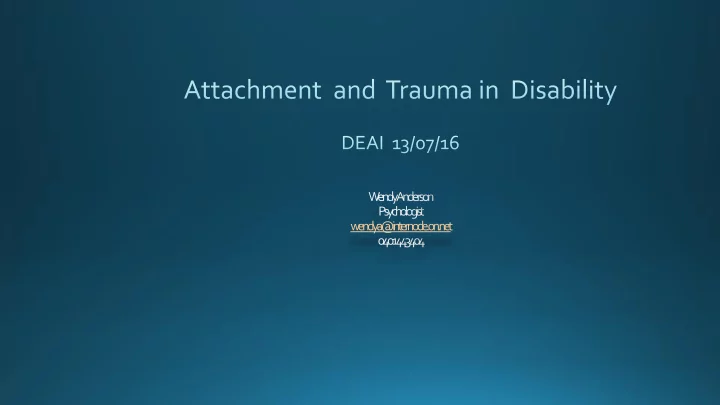

w e n d y a @ i n t e r n o d e . o n . n e t
ATTACHMENT Attachment theory is the theory of emotions The primary theory related to the development of personality
ATTACHMENT 5
Is deceptively simple on the surface has experienced a resurgence due to neuro- biological findings 2000’s the “decade of the brain” Neurobiological understanding of the basics of relationships , trauma , attachment and affect Brain is hard wired for relationship and is use dependent Eg Role of right brain , mirror neurones , and inter-subjectivity Right brain is dominant “for maintaining a coherent, continuous and unified sense of self” and “is pre -eminent in all unconscious relational interactions” .Polyvagal theory
Attachment theory increasingly being regarded as a regulatory system Emotions Emotions regulated with regulated by Self regulation the help of the caregiver the caregiver The younger the emotional age of the person the more they will need the help of a carer to regulate their emotions
Study on Attachment in Children with Down Syndrome
www.lesterboal.net/photo/Ellie_9_mth/640/46.jpg
Research resolution of diagnosis and attachment (CP) Marvin and Pianta , 1996
Children With Autism Meta analysis Rutgers et al 2004
Disability and childhood abuse
World of the child who is a victim of child abuse “fear without solution.' In other words, the caregiver is both the source of the child's alarm as well as the child's haven of safety. I feel all alone without anyone here to help me with these feelings that are too big for me to cope with by myself
overwhelms almost three times
http://drawingtheidealself.co.uk/drawingtheidealself/Downloads_files/Coventry%20Grid%20Version%202%20- %20Jan%202015.pdf
Prognosis of children with attachment disorders even in non disabled population
+ predictable - tension + safe - isolation +fun - fear +relaxed - rage +Joined
DANIEL HUGHES MODEL CHOICES AND CONSEQUENCES 46
Choices and Consequences (continued) 48
Attunment Staff/ parent to read the emotion and mood behind the behaviour Modify our interactional style to be “in tune” with client eg if happy , match this and up the fun ; if anxious soften tone use reassuring voice tone Name the person’s emotions (if you know it ) “You seem happy today , its great feeling ” “You are anxious today , trying something new can be scary/ daunting “ “You look angry that you missed out…..There will be another time”
Daniel Hughes Attunement (continued ) 50
Behavioural Scripts 51
Daniel Hughes Model : Care for Carers “A SOCIETY WHO VALUES ITS CHILDREN MUST CHERISH THEIR PARENTS ”. John Bowbly 52
a Staff SELF CARE programme 53
54
Trauma Informed Care re-traumatization
"The enduring effects of abuse and related adverse experiences in childhood" American Psychiatric Association https://aifs.gov.au/cfca/publications/child-maltreatment-and-disability https://www.sott.net/article/256043-Polyvagal-Theory-Sensory-Challenge-and-Gut-Emotions
Janssen CG Schuengel C Stolk J Journal of Intellectual Disability Research . Rutgers AH Bakermans-Kranenburg MJ van Ijzendoorn MH van Berckelaer-Onnes IA Schuengel C Kef S Damen S Worm M Journal Intellectual Disability Research . Sheeran T Marvin RS Pianta RC J Pediatr Psychol. Siller M Swanson M Gerber A HutmanT Sigman M Autism Dev Disord. www.samhsa.gov/nctic/trauma-intervetnions
Recommend
More recommend